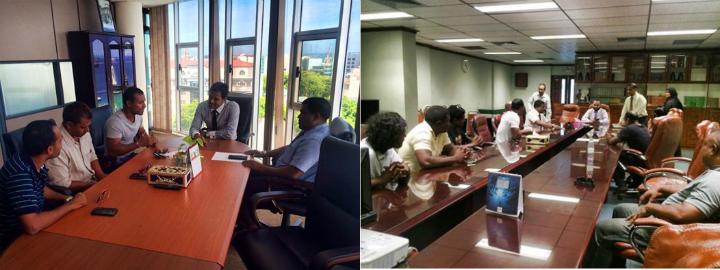June 14th – 20th
The government’s legal and political tussles grabbed headlines this week, with past, present, and future disputes all making the news.
This week’s biggest story came courtesy of spurned Indian infrastructure giant GMR, who revealed a Singapore arbitration court had deemed their terminated airport development deal “valid and binding”.
Being requested to pay US$4 million in procedural costs while the court determines the amount owed to GMR, the government interpreted the outcome as a success, predicting that the damages owed would be far less than the US$1.4 billion sought.
After the issue of a warrant to enforce the appearance of Home Minister Umar Naseer at his disobedience to order trial, the minister appeared at the Criminal Court of his own volition upon his return from his official trip to Europe.
Naseer promptly refused to cooperate with the trial until his procedural objection – already rejected by the judge – had been appealed.
The government’s disputes in the political arena also continued this week, with ejected coalition partner, the Jumhooree Party (JP), striking a conciliatory tone after the recent break-up.
The JP maintained that the coalition agreement had not been breached, while the party continued to haemorrhage members to its former ally the Progressive Party of Maldives – the economic development minister and two more MPs being the latest to switch allegiance.
The Progressive Coalition’s fast-growing majority in the Majlis resulted in what the Maldivian Democratic Party (MDP) interpreted as excessive representation in the Majlis’ standing committees, leading to the cancellation of sittings and threat of street action.
While taking pains to distance his party from such maneouvres, MDP leader Mohamed Nasheed suggested President Abdulla Yameen’s fate would likely be the same as his – predicting his eventual removal in a future coup.
Brigadier General Ahmed Nilam this week submitted a case to the Human Rights Commision, suggesting his suspension and subsequent dismissal were linked to the events of Nasheed’s chaotic departure from office in February 2012.
The second UNDP Human Development Index report raised questions as to how equitably economic growth was being distributed, with research revealing glaring disparities opening up between progress in the capital and the atolls.
Phase two of expansion of Malé’s suburbs continued regardless, with a US$50 million dredging contract awarded to a Belgian company for phase two of the Hulhumalé expansion project.
Despite expressing continued reservations about the Maldives’ public account imbalances, the World Bank this week anticipated continued development of the economy with 4.5 percent GDP growth predicted.
Meanwhile, Hope for Women this week predicted unwelcome growth in the workload of female civil servants during Ramadan after the alteration of working hours for the month of fasting.
The World Cup in Brazil – for which the government has already allowed extended trading hours – was suggested as a possible reason for the adjusted working times, though the President’s Office maintained that the change was intended to facilitate late night prayers.
This week also saw the Islamic Ministry hold a closed conference with scholars to discuss reports of Maldivian jihadis journeying to Syria, while Foreign Minister Dunya Maumoon called on the Umma to assess the persistent association with terrorism and intolerance.
